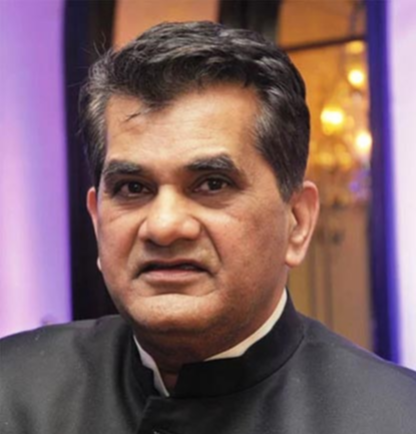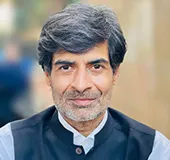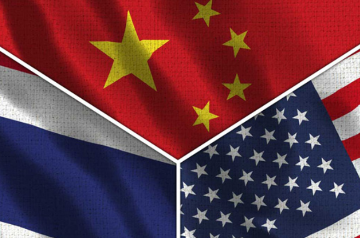Editors’ Note
India assumed the presidency of the G20 at a moment of crisis in world affairs. Global growth had slowed. Post-COVID-19 economic recovery was uncertain, uneven, and unequal. In many nations, decades of progress on poverty had been reversed. Countries were reeling from a sovereign debt crisis, causing funding for sustainable development to dry up. And the war in Ukraine had disrupted international supply chains, causing disruptive food and fuel inflation.
Nevertheless, the Indian presidency was determined to be ambitious, decisive, and focused on action. India’s most important priority, after years of unequal growth and a vacuum in global governance, was inclusion. Thus, from the outset, the presidency championed the needs of the Global South. The pioneering ‘Voices of the Global South Summit’, held in January 2023, saw India engaging with 125 other developing nations to understand their concerns and shape the G20 agenda accordingly. An initiative of this kind had never been undertaken before, and it cemented India’s commitment to lead an inclusive, reformed multilateralism. It was in keeping with the civilisational attribute of ‘Vasudhaiva Kutumbakam’ (one earth, one family, one future) that guided India’s actions at the G20. India’s priorities within the G20 framework were centered on the core principles of the “4D” approach: advancing decarbonisation, digitalisation, ensuring equitable development, and de-escalating conflicts. These principles aim to address global challenges comprehensively.
With the 83 paragraphs of the New Delhi Leaders’ Declaration (NDLD) agreed to by a full consensus, India has matched ambition with action during its presidency. With the inclusion of the African Union as a full member of the G20, India has brought to the table the voice of Africa, with 55 additional countries having a say in the most pertinent global issues. India has put forward an ambitious seven-year Action Plan to Accelerate Progress on the SDGs, which presents a coordinated, integrated, and inclusive roadmap for G20 actions. The G20 agreed on a Green Development Pact for a sustainable future, which includes bold and ambitious commitments on climate finance, global just transitions, and mainstreaming lifestyles for sustainable development (LiFE). India has emphasised that a quantum jump in investment, from billions to trillions of dollars, to meet our collective SDG and climate goals is required. Crucially, it also recognised the role of private enterprise and capital in this regard, and the need to reform multilateral development banks (MDBs).
The NDLD highlighted the transformative and inclusive role of technology, focusing on unlocking the potential of digital public infrastructure (DPI) and data for development to achieve SDGs and use AI in a responsible manner for social empowerment and inclusion. One of the biggest achievements of the India-helmed G20 is the emphasis on women-led development with a focus on empowerment and gender equality. The establishment of the G20 Women’s Empowerment Working Group represents a highly promising development, which Brazil will carry forward. The NDLD affirms the centrality of strong, sustainable, balanced, and inclusive growth. In this regard, it emphasises the critical role of private investment and capital, in both unlocking growth and also in development and climate finance.
The Think20 (T20) is the G20’s Engagement Group for think tanks. It is, in effect, the leaders’ ‘ideas bank’. The Observer Research Foundation served as the official T20 Secretariat during India’s presidency. It facilitated the exchange of perspectives among high-level experts, policymakers, researchers, and practitioners; produced policy briefs and other knowledge products relevant to the G20; and oversaw the organisation of side events to enable further discussions around the G20’s priority themes. Taken together, the T20’s activities lent analytical depth and rigour to the G20’s deliberations. They bridged what the Canadian political scientist Thomas Homer-Dixon calls the ‘ingenuity gap’—the difference between the demand for actionable, innovative ideas to solve complex challenges, and the actual production of those ideas.
This compendium is a collection of 27 T20 policy briefs and a special contribution, chosen from over 320 such briefs published during India’s tenure in 2023. Authored by thought leaders and subject experts collaborating across different institutions, geographies, and disciplines, they cover all seven of the T20’s thematic areas (1). They also represent some of the finest ideation and writing worldwide. Collectively, they make for an extraordinarily rich corpus of policy ideas and solutions for the problems of global governance. Many of them have fed into the deliberations of various working groups and ministerial meetings, and supported the G20’s efforts to deliver effective interventions.
For instance, the brief entitled ‘Mobilising Tax Revenue for Sustainable Development in Asia’ (by Yuho Myoda, Donghyun Park, Yothin Jinjarak, Shu Tian, Gemma Estrada, Robert Breunig, Sanjeev Gupta, Samuel Christopher Hill, and João Tovar Jalles) examines the enabling tax reforms that would support revenue mobilisation for the SDGs. The chapter by Matthew Stephenson, Jonathan Douw, and Peter Draper questions the equilibrium between trade and peace, and suggests a TIPS (Trade and Investment for Peace and Stability) framework for the G20 that could balance the two. Rachel Thrasher and Purvaja Modak outline recommendations for the disposing of trade disputes by establishing a more effective Appellate Body for the G20 countries.
Broad consultation with the countries of the Global South enhanced the Indian presidency’s existing concerns related to the sovereign debt crisis, which is the greatest challenge for the global economy and for the timely achievement of the SDGs. Many African countries are particularly exposed to fiscal stress. Miguel Otero Iglesias, Beatrice Grace Aluoch Obado, and Agustín González-Agote suggest that the G20 coordinate debt restructuring efforts and work with the African Union to address underlying issues. In another chapter, Gracelin Baskaran, Amara Ekeruche, Chris Heitzig, Aloysius Uche Ordu, and Lemma W Senbet propose three mechanisms for financing climate-resilient infrastructure on the continent.
The Indian presidency, learning from its own domestic experience, prioritised the benefits of new tech platforms and the use of data for development. The chapter ‘Using Data to Advance the 2030 Agenda: Recommendations for the G20’ by Anirban Sarma and Debosmita Sarkar proposes eight strategies for leveraging big data for development and boosting efforts to achieve the SDGs. Arasy Pradana discusses how public-interest tech solutions can learn from the start-up ecosystem to ensure that bureaucracy-designed technology systems meet the needs of the governed. The paper ‘Building an Information-Sharing Mechanism to Boost Regulatory Frameworks on Cross-Border Data Flows’ by Pramila Crivelli, Rolando Avendano, and Jong Woo Kang recommends the establishment of a centralised digital regulation and information repository to enhance cross-border data flows.
In the space of agriculture, Ricardo Abramovay, Ana Paula Bortoletto Martins, Nadine Marques Nunes-Galbes, Estela Catunda Sanseverino, and Juliana Tangari highlight the urgent need to reorient agri-food industries to promote sustainable and healthy consumption patterns. Ram Dhulipala, Nipun Mehrotra, and Ajit Kanitkar offer a novel vision of DPI for sustaining new development pathways for agriculture across the G20. Argarkul Ramaprasad, R Gowrish, and Vishal K Mehta present a roadmap for climate-smart agriculture in India. Gabriella Perin and Fabio Veras Soares provide lessons from Brazil’s food procurement programme that could prove valuable for other G20 countries as they seek to accelerate progress towards Agenda 2030.
Ensuring gender equality is a foundational challenge to development and a major priority for India domestically and globally. Two papers highlight the case of unpaid domestic and care work that remains unaccounted for in GDP calculations. Devkanya Chakravarty and Manoranjan Pattanayak outline possible methodologies for moving towards a more gender-inclusive measure of GDP, while Sumita Ketkar, Roma Puri, and Sahana Roy Chowdhury urge the G20 to push the envelope to help bridge the gender pay gap.
Reform of the international financial architecture and addressing the climate crisis are two of the core purposes of the G20. The intellectual firepower assembled for this issue by the Indian presidency was formidable. Manon Fortemps, Jens Sedemund, Özlem Taskin, Amarendra Bhattacharya, Arjun Dutt, Arunabha Ghosh, and Paulo Esteves examine how to create an enabling environment for the US$1 trillion a year in external financing needed by the developing world. Dongmei Chen, Rolando Fuentes, Alloysius Joko Purwanto, Noura Mansouri, and Yongzhong Wang emphasise the importance of sustainable and resilient supplies of critical minerals for meeting global net-zero emission targets. Matthew Stephenson and Samir Saran recommend boosting climate-related FDI by creating a ‘climate-friendly investment climate’. Soumya Bhowmick and Nilanjan Ghosh propose a ten-point agenda to bolster SDG financing in the context of contemporary shocks and crises. Uday Khemka, Aaran Patel, and Katherine Stodulka suggest the creation of a new highway for private financial flows to accelerate green investments in the G20’s emerging and developing economies. And Alin Halimatusadiah, Bambang Brodjonegoro, Fukunari Kimura, Muhammad Adriansyah, Muhamad Chatib Basri, Teuku Riefky, and Wing Thye Woo outline a long-term development investment framework for plugging the sustainable finance gap for the low and middle-income countries.
Going beyond the standard measures of economic prosperity, Colin Mayer and Dennis J Snower present an ethical framework for measuring prosperity that encompasses social and environmental elements. Hafida Fahmiasari, Danang Parikesit, and Fauziah Zen discuss the alternative financing mechanisms for channelising disaster finance resources for the small islands of the G20’s member states.
With respect to public health, Viola D’Souza, Sanjay Pattanshetty, George Wharton, Helmut Brand, and Oommen Kurian propose modifications to the draft pandemic treaty to improve pandemic preparedness and response by strengthening global cooperation. Flavia Bustreo, Anshu Banerjee, David A Ross, Thahira Shireen Mustafa, Oommen Kurian, and Anshu Mohan suggest ways to establish maternal, newborn, child and adolescent health and well-being as a critical agenda item for the G20.
Amlan Mishra, Soham Banerjee, Smita Chakravarty, Shubhi Goel, Dorothy Ashmita Biswas, and Veena CP suggest how subnational agencies might be empowered through a multilateral approach for them to combat climate change more efficaciously. Charlotte Unger and Sonja Thielges reflect on the benefits and challenges of expanding the G7 Climate Club to a G20 Climate Club. Tashina Cheranda, Kanchan Kargwal, and Sahil Mathew provide a framework for quantifying the climate co-benefits of natural resource management-based development programmes as part of broader endeavours to meet climate targets. Finally, the essay by N.K. Singh outlines a triple mandate and a set of strategies for MDBs to enhance their lending capacity, evaluate their risk tolerance, and create mechanisms for securing additional capital from the private sector. To ensure accountability, it also provides a timeline for implementing various interventions.
India’s G20 presidency sought to identify programmes and ideas that would last beyond its tenure. The years between 2022 and 2025 are a historic pivot for global governance; the G20 troika-plus-one in this period will consist entirely of emerging economies. This four-year window will prove crucial for the developmental journey of the Global South and North alike. In a time of division and contestation, the Indian presidency built an informed and forward-looking consensus on inclusive, sustainable development. The ideas in this compendium reflect that ethos and provide the foundation for a new and reformed multilateralism that can restore growth, build trust, and move the world closer to meeting its shared development goals.
Amitabh Kant, G20 Sherpa, India
Samir Saran, President, Observer Research Foundation
Endnote
(1) These seven areas correspond to the seven T20 Task Forces on ‘Macroeconomics, Trade, and Livelihoods’; ‘Our Common Digital Future’; ‘LiFE, Resilience, and Values for Well-being’; ‘Clean Energy and Green Transitions’; ‘Reassessing the Global Financial Order’; ‘Accelerating SDGs’; and ‘Reformed Multilateralism’.
The views expressed above belong to the author(s). ORF research and analyses now available on Telegram! Click here to access our curated content — blogs, longforms and interviews.

 PDF Download
PDF Download



 PREV
PREV



